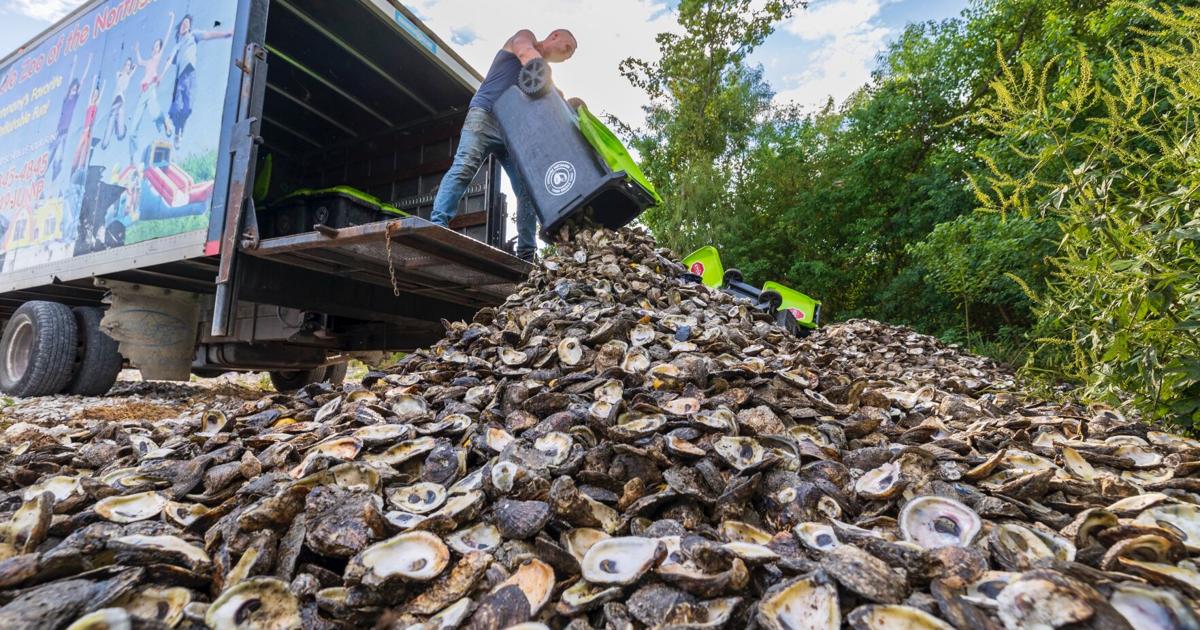Louisiana
Millions of pounds of oyster shells are being recycled to help restore the Louisiana coast

One night in March, Jason Pitre left his Bayou Rosa Oyster Farm in Leeville with sacks of oysters bound for a fundraiser in New Orleans. He’d just pulled those oysters from the waters of Bayou Lafourche, the same his family has worked for four generations.
As he opened each oyster, he knew that eventually their shells would be headed back to the coastal again.
The shells were collected during the event and fed into a stream of oyster shells, measured in the millions of pounds, that will be used to restore Louisiana oyster reefs. That’s helping cultivate more oysters, boosting ecosystems around them and contributing to coastal restoration efforts.
Containers for oyster shells only outside Bourbon House in the French Quarter of New Orleans on Friday, April 5, 2024. They will be used to help rebuild the coast. (Photo by Chris Granger, The Times-Picayune)
“I know the effect these reefs have on our living shoreline,” said Pitre, a member of the United Houma Nation who counts oyster farming as part of his heritage. “It’s rewarding to know that what I grow will go back into the water to help the coastal restoration fight that we’re in. It’s this whole circle of life being completed.”
Pitre was one of a half dozen oyster farmers serving samples of their harvests at Shell-a-Bration, the annual fundraiser held at Audubon Zoo for the Oyster Shell Recycling Program. The initiative is part of the Coalition to Restore Coastal Louisiana, a New Orleans-based nonprofit that advocates to protect the state’s coast.
The Oyster Shell Recycling Program works with restaurants to collect oyster shells that would otherwise be headed to the landfill and puts them back to work for the coast.
Restoring the loop

Oysters stacked and waiting to be chargrilled at Bourbon House in the French Quarter of New Orleans on Friday, April 5, 2024. (Photo by Chris Granger, The Times-Picayune)
The shells become the building blocks for reef restoration projects, and the coalition has been working specifically with indigenous communities, selecting project areas where they can help protect sites of special cultural and environmental significance.
The program is 10 years old, but the idea is not a new one.
“It’s filling a gap in a process of returning shells to the wild, a process that’s been around since people started eating oysters, because people always knew they provide habitat for more oysters,” said Darrah Bach, recycling program manager for the coalition.
But without direct connections to oyster lease holders, most restaurants simply throw shells in the trash like all the other kitchen waste.

Oyster remains at Bourbon House in the French Quarter of New Orleans on Friday, April 5, 2024. (Photo by Chris Granger, The Times-Picayune)
“We’re restoring that loop, giving restaurants a way to get shell back to where it can do the most good,” she added.
Oyster reefs beget more oysters. Baby oysters need a platform on which to grow, and the shells of other oysters are ideal for this purpose. As oysters layer up upon oysters, reefs form and grow higher and thicker.

Shucking oysters at Bourbon House in the French Quarter of New Orleans on Friday, April 5, 2024. (Photo by Chris Granger, The Times-Picayune)
This creates habitat for other sea life, but the benefits of healthy and restored reefs are far reaching. They can serve as buffers between the open water, communities and habitats along the coast. During storms, reefs act as underwater speed bumps, and even in calmer times they break up the wave energy approaching fragile coastal features.
One vivid example is playing out in Plaquemines Parish, in Adams Bay, where the coalition and its partners deployed 150 tons of shells to restore a reef to better protect what’s known as the Lemon Tree Mound.
While the space is an ancient Native American archaeological site, saltwater intrusion and wave action killed its namesake trees and threatened to wipe out the mound. Since the reef restoration began here in 2021, the mound’s grassy footprint has been expanding behind this rampart-like reef.
Expanding the harvest

Serving fresh oysters at Bourbon House in the French Quarter of New Orleans on Friday, April 5, 2024. (Photo by Chris Granger, The Times-Picayune)
The Oyster Shell Recycling Program has steered some 14 million pounds of oyster shells back to the coast over 10 years, and the 30 restaurants participating now contribute about 1.5 million pounds a year.
To customers the recycling process is largely invisible, and for restaurants it’s simply a matter of steering shells to bins for recycling collection. Many of the biggest names in the New Orleans oyster scene take part, including Acme Oyster House, Felix’s, Drago’s, Casamento’s and Sidecar.
Dickie Brennan’s Bourbon House in the French Quarter was the first restaurant to sign up for the program, and today, every one of the roughly 2,000 oysters shucked daily at its busy oyster bar join the reef restoration effort. When the same restaurant group acquired historic Pascal’s Manale Restaurant last year, one of the first orders of business was to add its oyster bar to the program also.

Wear and tear evidence from years of shucking oysters on a counter at the oyster bar at Bourbon House in the French Quarter of New Orleans on Friday, April 5, 2024. (Photo by Chris Granger, The Times-Picayune)
Recycling bins at the restaurants are emptied several times a week, and the shells are hauled to a curing site in St. Bernard Parish, where they sit in the sun and open air until they’re ready to deploy.
The program charges restaurants for the service, likening it to any other recycling or waste disposal service.
However, now there’s help available to cover that cost. In January, the state enacted a new tax credit for restaurants that recycle oyster shells, at a rate of $1 per 50 pounds of shells recycled.
“We’re hoping that will be a big motivator for more restaurants to join the program,” Bach said.
The tax credit comes as the coalition is also expanding the geographical reach of its recycling program. Right now, all participating restaurants are in the New Orleans area, but the group wants to add restaurants in Baton Rouge and is now looking for contractors to haul shells. The group is eyeing potential further expansion with restaurants around Lafayette and Houma.

Shucking oysters at Bourbon House in the French Quarter of New Orleans on Friday, April 5, 2024. (Photo by Chris Granger, The Times-Picayune)
Making connections
Shell collection was temporarily shut down in the early phases of the pandemic, when restaurants were closed. But participation grew as restaurants started coming back, with assistance from one of the coalition’s partners.
Chef’s Brigade is a grassroots group that quickly formed to help keep New Orleans restaurants in business during the bleakest part of the pandemic — and founder Troy Gilbert, an advocate for coastal restoration, connected many of these restaurants with the recycling program along the way.

A sack of raw oysters at Bourbon House in the French Quarter of New Orleans on Friday, April 5, 2024. (Photo by Chris Granger, The Times-Picayune)
Today Chef’s Brigade also operates a program called Chefs on Boats, which brings restaurant staff out on boat tours to the front lines of coastal loss and restoration, including to oyster reefs built on recycled shells.
“They’re making that connection between what they’re doing in their restaurants, where it comes from and the good those shells could do again, why it’s worth making the change in their operations,” Bach said.
The effort has also become a recruiting tool for the recycling program, giving a firsthand perspective on the difference restaurants can make through one change in their operations. As more people learn about the oyster shell recycling program, it’s also making that connection between restaurant customers and oyster aficionados.

Oysters stacked and waiting to be chargrilled at Bourbon House in the French Quarter of New Orleans on Friday, April 5, 2024. (Photo by Chris Granger, The Times-Picayune)
The Coalition to Restore Coastal Louisiana has public access recycling bins situated around New Orleans, where people who open oysters at home can recycle shells at no charge. The public can support the program through contributions, and there are also hands-on volunteer opportunities with shell bagging events through the year.
“Another way people can support this is just to ask at the restaurants they visit if they recycle,” she said. “That helps build awareness.”

Louisiana
U.S. Sen. Bill Cassidy touts infrastructure grants awarded to Louisiana municipalities, utility districts during Donaldsonville event

Louisiana U.S. Sen. Bill Cassidy released a statement after awarding more than $52 million in grants from the Infrastructure Investment and Jobs Act to municipalities and gas utility districts during an event May 17 in Donaldsonville.
“This money will decrease the risk of explosion and decrease the amount of wasted methane which people are paying for, thus saving folks money,” Cassidy said in the announcement. “It also cleans up our environment. It’s a good investment of taxpayer dollars for the benefit of folks in Louisiana.”
In an effort to safeguard natural gas pipelines, nearly $1 billion will be awarded over a five-year span throughout the country with $392 million being awarded this year, the senator added.
As previously reported, the cities of Donaldsonville, Port Allen and Walker, the town of Berwick, and gas utility districts in East Baton Rouge, East Feliciana and West Feliciana parishes were grant recipients.
Similar funding was awarded last April with more than $27 million going to municipalities in south and central Louisiana.
Per Cassidy, the IIJA has awarded more than $9.1 billion to Louisiana since the president signed it into law in late 2021.
The funding has gone toward repairing bridges, building flood protection systems and extending broadband in rural areas.
Cassidy noted Donaldsonville Mayor Leroy Sullivan’s city received the largest grant, which was $20 million to replace 27.3 miles of natural gas infrastructure.
Sullivan said the gas line improvement grant from the Pipeline and Hazardous Materials Safety Administration “is a pivotal moment for the City of Donaldsonville.”
“Sen. Cassidy was instrumental in helping us secure this funding and we are deeply grateful for his unwavering support.,” the mayor said in the announcement. “This project is an investment in the future of our city and positions our community for continued growth.”
Gonzales Weekly Citizen and Donaldsonville Chief, part of the USA Today Network of Louisiana, cover Ascension Parish and the greater Baton Rouge area. Follow at facebook.com/WeeklyCitizen and facebook.com/DonaldsonvilleChief.
Louisiana
St. Tammany library board members sue over removal • Louisiana Illuminator

Three St. Tammany library board members removed after a years-long fight over book content are suing the parish council and one of its district representatives in an attempt to block their removal.
Their federal lawsuit comes after the parish council voted earlier this month to replace five of the six members of the St. Tammany Library Board of Control, a volunteer body that oversees the parish library system. Their removal culminated months of contentious fights.
Conservative activists in the parish, led by the far-right St. Tammany Library Accountability Project, attempted to ban more than 150 books it deemed sexually explicit. Most of the titles challenged have LGBTQ+ themes. The library board repeatedly refused to limit access to the books, rejecting arguments that the books were sexually explicit. Their refusal put them crosswise with the new, more conservative parish council that took office earlier this year.
The three board members — Bill McHugh, Anthony Parr and Rebecca Taylor — are suing the St. Tammany Parish Council and Councilman David Cougle, a founder and attorney for the Accountability Project who led the charge to remove the members. The plaintiffs have asked the court for a temporary restraining order on their removal, which would allow them to stay in their positions while the lawsuit plays out.
GET THE MORNING HEADLINES DELIVERED TO YOUR INBOX
In a statement, the plaintiffs emphasized the lawsuit was undertaken by them as individuals, not as an official action by the library board. They also noted Kelly LaRocca, the parish’s library director, is not involved in the suit.
Cougle has not yet responded to a request for comment for this report.
On May 4, the parish council voted to replace five board members, ostensibly because the council had discovered the board was not serving in staggered terms, as required by state law. But rather than staggering the current board members, the council used the opportunity to remove board members that resisted book restrictions.
That violated the First Amendment rights of the ousted board members, the plaintiffs charge.
“Plaintiffs were engaged in constitutionally protected activity when they spoke and acted at Library Bord [sic] meetings, as well as when they spoke out on matters of public concern such as the controversy over books with LGBTQ themes and characters, the presence or absence of sexually explicit material in libraries, whether or not certain materials available in libraries is ‘pornography’ or constitutes ‘obscenity,’ and whether and how minors have access to such materials,” the lawsuit reads.
The lawsuit alleges the concern over staggered terms was an “obvious ploy” used to retaliate against their protected speech and their refusal to restrict access to books.
“Supreme Court precedent has focused “not only on the role of the First Amendment in fostering individual self-expression but also on its role in affording the public access to discussion, debate, and the dissemination of information and ideas,” the lawsuit says. “And it has recognized that ‘the State may not, consistently with the spirit of the First Amendment, contract the spectrum of available knowledge.’”
The suit has been filed in federal court for the Eastern District of Louisiana. If the court opts to grant a temporary restraining order, the existing library board would be allowed to continue serving pending the outcome of the lawsuit, which seeks to permanently block the council’s resolution to remove members.
“Preventing the Parish Council from engaging in unlawful patronage dismissal will preserve the integrity and independence of the Library Board, rather than leaving it subject to the political whims of the Parish Council,” the lawsuit says.
The lawsuit also says allowing the members to continue serving would continue to protect the public’s constitutional rights to receive information by maintaining their access to library books.
Louisiana
Louisiana Businesses Are Committed to Creating a Culture of Cleanliness


Sponsored by Keep Louisiana Beautiful
In just one year, over 450 businesses and 36 chambers of commerce have joined Keep Louisiana Beautiful’s (KLB) Clean Biz Partnership, committing to serve their communities as environmental stewards and promoting a culture of cleanliness amongst their employees. Not only are these partners already implementing best practices for litter prevention and waste reduction, but they are eager to continue their sustainability journey.
“A clean Louisiana is vital for business and future economic development,” said Lieutenant Governor Billy Nungesser. “People don’t want to visit or do business in communities that are littered. We must take pride in where we live and keep Louisiana clean and beautiful.”
“In 2023, KLB’s litter study found that 92% of Louisianans believe litter is a problem, and it  costs taxpayers $91.4 million each year,” said Susan Russell, KLB Executive Director. “Litter hurts real estate values, harms wildlife, and it pollutes our environment. If we all do our part, businesses included, we can stop litter from happening in the first place.”
costs taxpayers $91.4 million each year,” said Susan Russell, KLB Executive Director. “Litter hurts real estate values, harms wildlife, and it pollutes our environment. If we all do our part, businesses included, we can stop litter from happening in the first place.”
To help prevent litter, Clean Biz Partners commit to:
- Picking up litter from their parking bays and/or around their business daily.
- Placing trash receptacles at their business storefront or at transition points.
- Maintaining a clean dumpster by keeping the lid closed and the area around the dumpster free of litter and debris.
- Maintaining their business lawn and landscaping.
- Participating in community improvement activities.
- Creating a culture of cleanliness for their employees and customers.
Ann Trappey, interim President and CEO of BRAC, stated, “Forty-eight businesses in Baton Rouge have joined the Clean Biz Partnership, with more joining each month. BRAC is proud to collaborate with Keep Louisiana Beautiful to clean up our community and empower business owners and their employees to implement simple measures to prevent litter. I encourage all businesses to join this free and valuable program.”
Sign up to be a Clean Biz Partner for free at keeplouisianabeautiful.org/cleanbiz. Upon joining the partnership, you will receive a window cling, a social media kit, and other marketing assets. Questions about the program can be directed jchappuis@keeplouisianabeautiful.org.


-

 News1 week ago
News1 week agoSkeletal remains found almost 40 years ago identified as woman who disappeared in 1968
-

 Movie Reviews1 week ago
Movie Reviews1 week ago“Kingdom of the Planet of the Apes”: Disney's New Kingdom is Far From Magical (Movie Review)
-

 World1 week ago
World1 week agoIndia Lok Sabha election 2024 Phase 4: Who votes and what’s at stake?
-

 World1 week ago
World1 week agoUkraine’s military chief admits ‘difficult situation’ in Kharkiv region
-

 World1 week ago
World1 week agoCatalans vote in crucial regional election for the separatist movement
-

 Politics1 week ago
Politics1 week agoNorth Dakota gov, former presidential candidate Doug Burgum front and center at Trump New Jersey rally
-

 News1 week ago
News1 week agoTrump, Reciting Songs And Praising Cannibals, Draws Yawns And Raises Eyebrows
-

 Movie Reviews1 week ago
Movie Reviews1 week agoAavesham Movie Review
/cdn.vox-cdn.com/uploads/chorus_asset/file/25457864/Wall_Outlet_H2_EU02_05.jpg)













